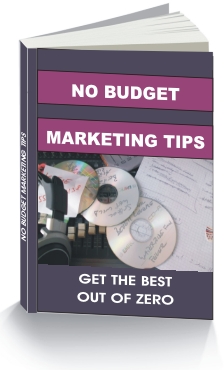With the current oversupply of music promotion tools, marketing methods, communities and advice musicians are very likely to lose track of it all. If we try to make use of every all-new tool and establish a presence in about every community there is, we’ll probably end up broke while gaining some 25 more working hours a day. At the end of the day we’re asking ourselves: Do I really have to do all this? And what of this can really be good for me?
Considering the fact that time and money don’t come in abundance – after all we’ll have to keep sales expectations in mind – it’s not a shame to just ignore certain music promotion tools, methods or communities and focus on a few very specific things instead.
Do it right, not half-heartedly
A little bit of advertising here and there will bring lesser results than intensive, focused promotion at a few carefully selected places. Advertising has its own set of rules. They say that receipients of promotional messages need to be exposed to such messages at least three times in order to actually notice them. In order to actually cause the receipients to take action yet more exposure becomes necessary.
So placing one-time ads in some 20 magazines will lead to less success (if any) than regular exposure in maybe five selected media outlets. We will talk about selecting the right media and methods soon. First let’s set a budget.
Determining the Budget
When determining a marketing budget we’ll have to take the following expenses into account: shipping costs for promo packages and press kits, advertising, promotional tools and services, maybe an outside promoter, paid services such as webhosting, newsletter, premiumaccounts etc.
Of course, our – realistic – sales expectations form the other part of the equation. How many CDs and downloads are we going to sell, at a minimum? Depending on where we sell our music we’ll be given different shares, our piece of the cake. An average payout per album can range from $ 5.00 to $ 8.50.
With a pressing of 500 CDs, for example, it is realistic to allow $ 5.00 per copy for expenses. Expenses for manufacturing, mix, mastering, artwork – and, of course, promotion. Depending on the complexity of the production this will leave $ 2.00 or 3.00 for promotion, per copy.
If we decide to rent a big studio or hire a renowned producer despite low sales expectations we’ll hopefully be able to score with a great product, however, we may probably be over budget right from the beginning, especially when we consider the average scores for unsigned musicians: according to CD Baby unsigned musicians sell just below 100 copies per album, physical and digital together.
Time Budget
Whether promotion is free or at a cost, it will always be time-consuming. So besides setting ourselves a monetary budget we can as well determine an amount of time we can dedicate to marketing our music daily or weekly. Setting priorities is smart: building new contacts, maintaining older contacts, doing interviews, shipping CDs, winning fans, social media, record and upload songs, profile and website maintenance, watching our competition.
Finding the right marketing methods
This is probably the most important and difficult part. We can never really tell which promotional activities are the best for us, however, we can get a few clues to help us find them.
Let’s take a look at our market niche, the style, the people and their preferences. Who are they? How old are they? Which media do they use, read or watch? Where do they hang out (virtually and in real life)?
Heavy Metal fans for example, are considered very traditional, physical buyers, often collectors. Fans of electronic and classical music like vinyl, kids use social media more intensively than an audience over 40.
A short survey via Facebook or free tools like SurveyMonkey can deliver a few more hints that point us into a certain direction.
Based on our new insights, available time and our budget we can decide more clearly than before where to spend our most valuable resources – time and money. Time actually plays a major role in that every promotional activity takes time to deliver results. It will not happen right over night. More than that it usually takes a few weeks or even months until we can be dead certain about the success of our campaign or its single components.
So which methods work?
It really differs from one artist to another, especially considering their styles and the varying preferences of their respective audience. A few tips, though: Be personal! Sample appropriate media personally, not via automated submission services. Contact radio shows yourself instead of having your music automatically added to automated playlists. Make sure the social media and online communities you are considering are not being used by musicians only. When hiring a promoter, make sure it’s someone you can call and personally discuss things with (avoid “your press release sent to 5,000 blogs” services).
When dealing with fans directly, address their feelings, confirm their views, show them you’re one of them. Spare them your “buy our new album” pitch. Pull, don’t push. Deliver your news regularly to keep a constant flow. Making sales should be your priority (not getting clicks, likes or re-tweets – they’re secondary).
To your sucess.
– Julian Angel
Get more tips and sign up for the
MusicBiz Madness Newsletter !!!
And get the e-Book “No Budget Marketing Tips” on top. ALL FREE !!!




